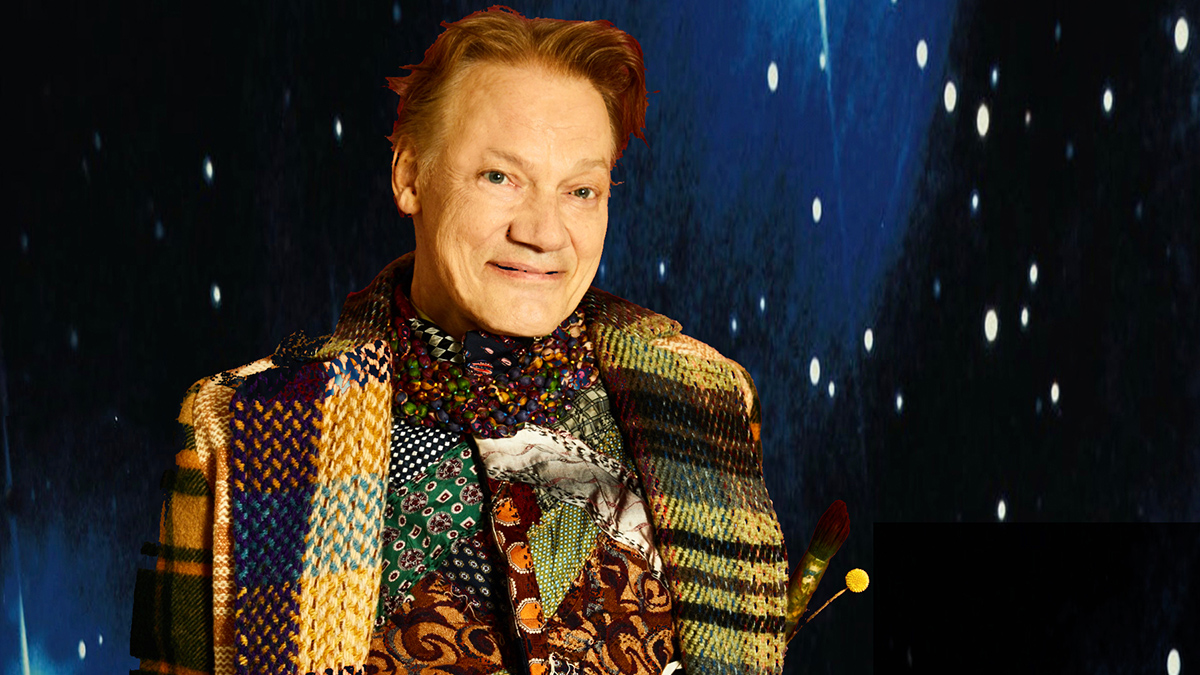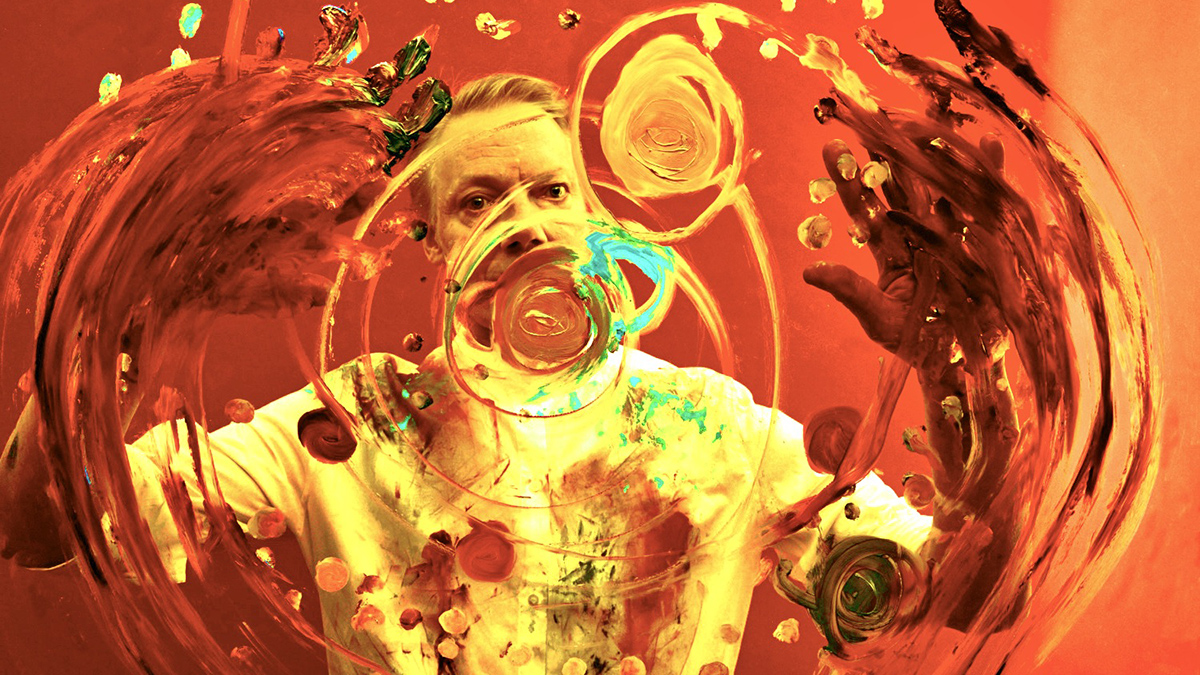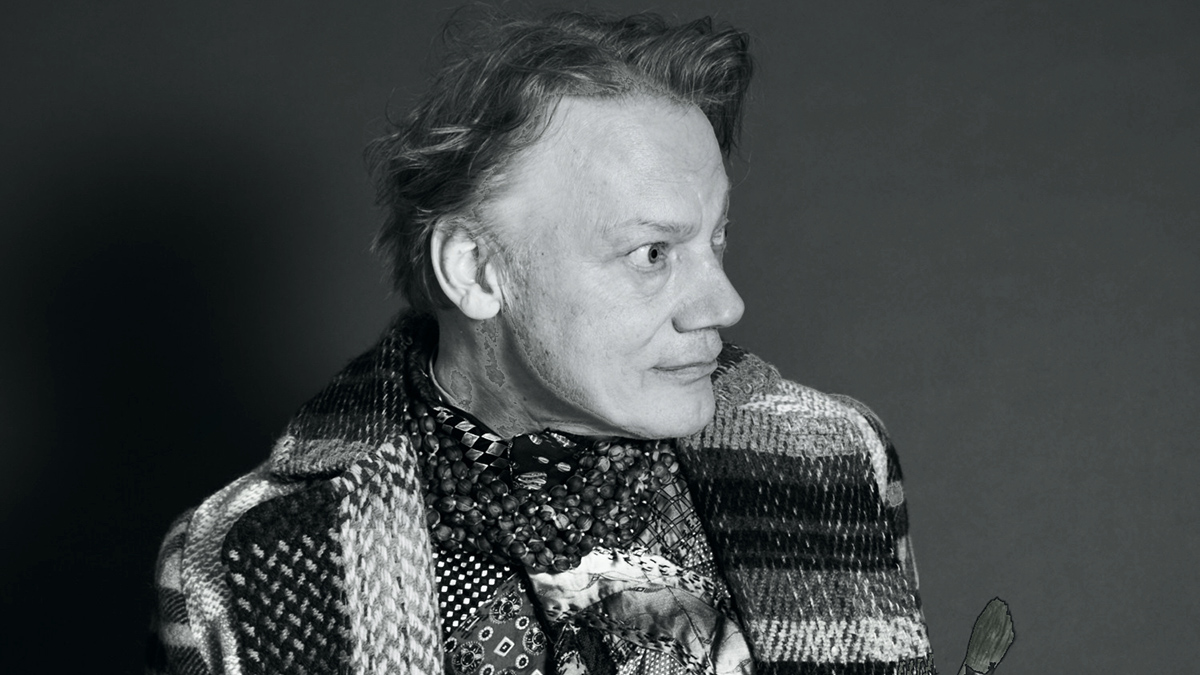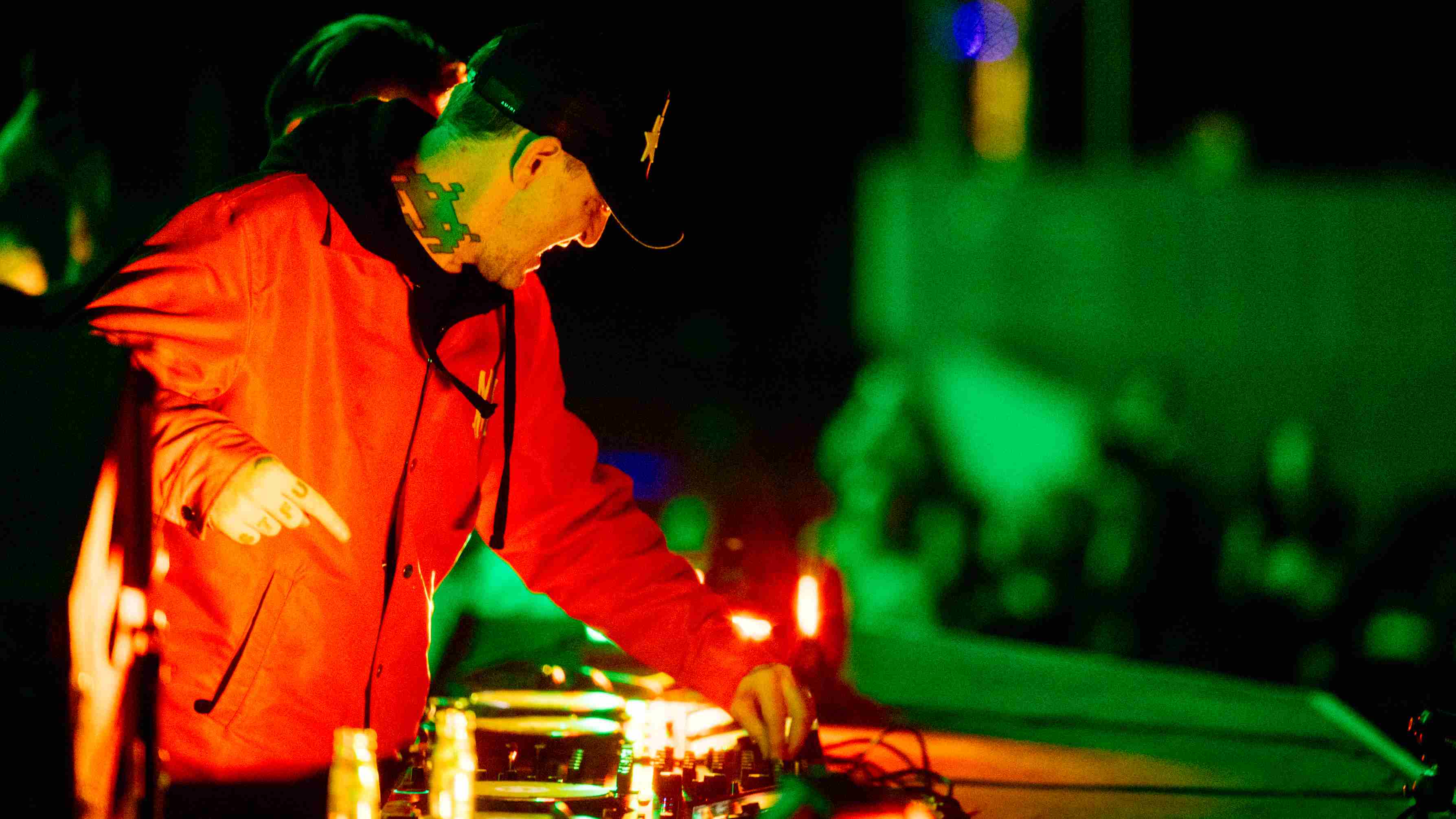William Orbit: "Pro Tools is a lot better than drugs, that's for sure!"
Super-producer William Orbit's career went on hold as he battled drugs and lost his confidence. The joy of painting and a beginner's guide to Pro Tools got his mojo back, and now he’s releasing his first new album in eight years…

William Orbit has produced and collaborated with some of the biggest names in pop, including Madonna, U2, Blur, Pink, Robbie and Britney to name but a very few.
He's won countless awards and sold millions of records, not to mention becoming a leading figure in the electronic music scene with his incredible Strange Cargo series and the classical reinterpretation album Pieces In A Modern Style.
But, as mighty as all of these achievements have been, it's the parts of his life in between that are often more incredible.
There were the times when Orbit was a "seasoned squatter", busking his way around Europe in the early days. Then, in the ‘80s, and after he'd been a model in Japan (as you do), his first band Torch Sing was signed to Miles (Stewart's dad) Copeland's IRS Records - the first life changer.
Once I got started, it started to flow and then it was a torrent and it felt like I was in 1997.
With the proceeds from that, Orbit created Guerrilla Studios, where he honed his production skills while the likes of The Cocteau Twins, Erasure, Gary Numan and, yes, Ricky Gervais made use of the facility. Then there was the first hit single: not the ambient/electronic masterpiece you might expect but Harry Enfield’s legendary Loadsamoney (Doin’ Up The House).
This all led to Orbit's successful solo career and production work on era-defining records - Madonna's greatest album, Ray Of Light, and Blur's 13 - and collaborations with Beck, No Doubt, Ricky Martin, Queen, All Saints and many more.
Down to Earth
But just as most of us would consider retirement after such an eventful career, Orbit's life took an unexpected turn. He started taking drugs in his early 60s, eventually succumbing to their dark side and becoming so psychotic that he once believed he was going to be assassinated by the Church of England and that he worked for the Royal Family.
Luckily, a spell in rehab eventually cleared his mind, but by this time - and after a series of less well-received releases - he had lost his confidence and the will to work with anyone, or release any new music.
Which makes this year's new album, The Painter, even more extraordinary. Better still, it's a real return to form - there are some stunning collaborations with Beth Orton, Georgia, Katie Melua and Polly Scattergood - but you have to ask how it happened.
The answers are typically Orbit: becoming a painter gave the album its name but it was a beginner's course in Pro Tools which reopened the floodgates. "It was inspiring," he says. “Once I got started, it started to flow and then it was a torrent and it felt like I was in 1997. It was a release, you know?"
Get the MusicRadar Newsletter
Want all the hottest music and gear news, reviews, deals, features and more, direct to your inbox? Sign up here.
New album The Painter has some extraordinary vocal talent on it. Was it easy to get them all involved?
“It was wonderful because I haven’t been doing this for a long time, and coming back wasn’t difficult. It almost felt like it fell into my hands. The singers all gave me their most passionate and wonderful vocals. I couldn’t have asked for better.”
Did you record the vocalists remotely or did they come into your studio?
"A couple of times I already had the vocal and built a track around it, like Beth's that was recorded at the beginning of the ‘90s. With Katie we did it in a Las Vegas casino called Palms. The rest were all long distance because of Covid. Natalie [Walker] was in Colorado, Lido [Pimienta] is in Canada, and various other people were singing it in. Normally they would hear a track that I had started and then send me their vocal. It was a bit basic as some people recorded theirs in a kitchen, but it doesn't matter."
Did you ask Madonna to appear?
"No, both of us are doing our thing. She's firmly attached to a project which is going well and I'm firmly attached to this, so we didn't, but I wouldn't rule it out in the future.
“I did unearth a track called Cuidado Con Mi Corazon, a track she and I did for Ricky Martin. I'd done a reworking of it just with some of her Spanish vocals. We did think about putting that on the record, but with albums it is often what you leave off, you know? I did discover a lot of unreleased material I did with her and maybe it will see the light of day one day."

The album comes after a fallow music period. What happened?
“I couldn’t face music, look at my equipment or even open a laptop. I had got into the 'songwriting for hire' game and found that didn’t really work so well. I felt I wasn’t getting a response and nobody gave a toss. I lost confidence in my own abilities and I had the perfect storm of personal issues building so music was the last thing on my mind."
We hear that a Pro Tools beginner's course helped bring it back, so why 'beginner's' after so many years of using it?
"I wanted to know about some of the features that I've always worked around. I'm pretty fly but was like 'what does this one do that has been staring me in the face for yonks?'. And then I realised how much I didn't know. As you race along and never read the manual you leave stuff behind
“I took this very good online course and it was marvellous. Every day you learned a new trick and it's never too late to learn. And that is also key to inspiration, because you find a new thing and you think 'I must apply that to something'."
You did have a struggle with drugs a few years back, so a lesser website might say that 'Pro Tools saved you from drugs'…
"Goodness me I have to de-compact that! Pro Tools is an immersive application that I particularly love. My favourite apps are Pro Tools, Photoshop and Final Cut Pro: immersive, creative worlds that you make your own. So, creativity saved me from drugs.
“I got into drugs belatedly in my life. My first druggy period was when I was 14 and I stopped when I was 17. And then my next one was when I was about 61! Pro Tools is certainly a lot better than drugs, that's for sure!”

The new album certainly has many trademark William Orbit sounds. Did you use a lot of old gear?
"I did use some old gear - I have a lockup full of synths but I'd actually lent them all out as they were not getting used. I used multitrack tape [to record] from '83 to '97 then, with the Madonna album, I went over to America and went 'Pro Tools'. So over this 14-year period I had amassed about 110 two-inch multitracks, so I had them all digitised, a vast archive of material that's never been released. I used some of it as sound sources [for the new album] - almost like a synth patch, as a starting point. So the album took 15 months to make or 15 years, and it was all done 'in the box' but before 'the box' was invented!”
So now you are in the box, what are your favourite plugins?
"The prosaic ones like EQ, compression and filters. I use a Focusrite three-band EQ, the Red one, for everything. It's always been my way: find one EQ I really like and I'll use it for everything. Ditto reverbs. People think I have an array of reverbs but it's just one or two. I just have a set of handy plugins that just shape a sound like a palette knife or a chisel."
What about favourite instrument plugins?
"Some of the sound-crafting ones are awesome. I do like [Native Instruments] Massive, but they have to fix this thing where notes just hang. I like a library like the next man. If I haven't got a real string section I use libraries. Kontakt is awesome and I love Melodyne as a remedial tool as well as a creative tool. A really good tool is fabulous for a little invisible mending but you can also use it to rock out on some wild areas."
Which hardware synthesizers have been your favourites over the years?
"The Korg MS-20: wildly unpredictable and if you get a good sound you need to get it down onto tape ASAP. The Roland Juno-106: I've been into Junos since the Juno-6 back in about 1980. Then I had the 60, then the 106. Ray Of Light, all the Strange Cargo records, half of it is the Juno-106.
I'd love to do something with Shakira, she's my favourite. I think she's a genius, actually.
“I also love the Roland JD-800 for its sonics although it is not as intuitive. It's big and takes up a lot of room but it is so rewarding to use. I've always liked Roland stuff and old analogue synthesizers, ones with the traditional controls. There are certain things to control and sculpt sound and you have to have easy access to them. You don't want to go through pages and pages of stuff."
You have obviously worked with many artists. Any favourites?
"A lot of them. I loved working with Bono; what a joy to be working with a singer like that. Also Beth Orton. We've always clicked and there are so many things I love about working with her. I've loved working with Madonna: moments of just musical magic. The session I did with Beck, we wrote a tune for Pink, and that was brilliant, we had such a laugh.
"Working with Blur for the first time, they had this tiny little studio that Damon [Albarn] had at the time. It was at the peak of a heatwave and we were all crammed in. Dave [Rowntree] was in the mix room drumming. Graham [Coxon] and Alex [James] had their guitars kicking off and Damon picked up the mic and it was like 'oh I love bands, I love that collective sound, oh yes'. There was something that was just gorgeous.
"So I've had great times and it's very hard to pick one. There are these fun, crazy sessions where everyone's wild and probably drinking too much and something comes out of it and then there are ones that are a struggle and suddenly there's a breakthrough. I just enjoy them all."
Would you like to get back to producing other artists again?
"Yes I would. I feel confident I've got something to offer. Sometimes working with artists, they are so perfect as they are that I think 'there's nothing I can contribute'. But there are a lot of artists where I think I could do something really cool if they are up for a bit of musical adventure. I'd love to do something with Shakira, she's my favourite. I think she's a genius, actually."
What else do you have planned with the new album?
"There will be an Atmos version and all of the tracks will have a painting and an animated version. I'm planning an art exhibition as well. And collaborating with some great artists and singers; yeah I love that. There's nothing I like more than to work with an artist to help make their vocal sound like heaven, so if you want me to help you, I'm ready to go. Here I am everybody, I'm at your service!"
William Orbit’s album The Painter will be released on 26 August and can be pre-ordered now.


Andy has been writing about music production and technology for 30 years having started out on Music Technology magazine back in 1992. He has edited the magazines Future Music, Keyboard Review, MusicTech and Computer Music, which he helped launch back in 1998. He owns way too many synthesizers.










